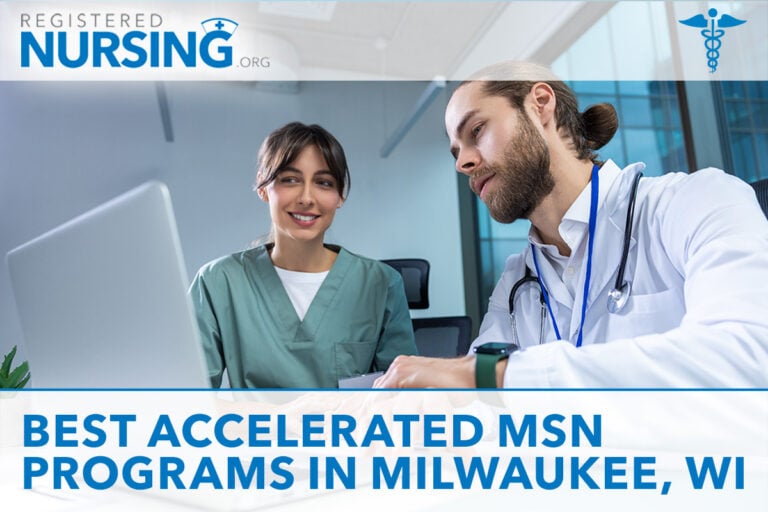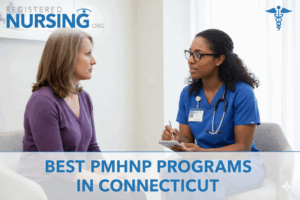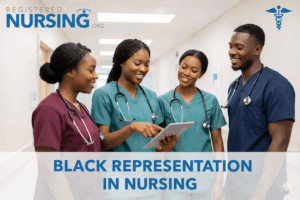Best Accelerated MSN Programs in Milwaukee, WI: Entry, Curriculum & Outcomes
- 2026 Best Accelerated MSN Programs Near Milwaukee, WI
- What Are Accelerated MSN Programs?
- Milwaukee’s Healthcare Landscape for MSN Graduates
- Overview of Direct-Entry MSN Programs in the Milwaukee Area
- Entry Requirements and Prerequisites
- Curriculum Structure and Intensity
- Clinical Rotations and Partnerships in Milwaukee
- Accelerated MSN Financial Considerations in Milwaukee
- Career Outcomes and Job Market in Milwaukee
- Licensing and Certification in Wisconsin
- Online Accelerated Programs
- Frequently Asked Questions
- Latest Articles & Guides

Milwaukee’s robust healthcare ecosystem offers exceptional opportunities for career changers seeking to enter nursing through accelerated Master of Science in Nursing (MSN) programs. With major health systems like Froedtert & the Medical College of Wisconsin and Advocate Aurora Health providing world-class clinical training environments, the city serves as an ideal launching point for second-degree nursing careers.
Accelerated MSN programs, also known as Direct Entry MSN (DEMSN) programs, enable individuals with non-nursing bachelor’s degrees to become registered nurses and advance to graduate-level practice in an accelerated timeframe. These intensive programs can be completed in as few as 16-20 months, allowing career changers to enter Milwaukee’s high-demand nursing workforce quickly while earning a master’s degree.
Milwaukee’s position as Wisconsin’s healthcare hub creates unique advantages for accelerated MSN students. The city hosts numerous clinical training sites, from academic medical centers to community health organizations, ensuring diverse educational experiences. Additionally, Wisconsin’s nursing shortage creates strong job security and competitive compensation for graduates entering the workforce.
Milwaukee Healthcare Quick Stats:
- Home to Froedtert & the Medical College of Wisconsin regional health network
- Advanced Practice Registered Nurses in Wisconsin earn average salaries of $116,990+
- Projected nursing shortage of 6,800+ RNs in Wisconsin by 2030
- Recent accelerated MSN programs report 93.86% NCLEX pass rates
- Traditional MSN: 3-4 years vs Accelerated MSN: 16-24 months
2026 Best Accelerated MSN Programs Near Milwaukee, WI
Marquette University
Milwaukee, WI - Private 4-year - marquette.edu
Master's - Direct Entry Master of Science in Nursing
Online & Campus Based - Visit Website
Marquette University's Direct Entry Master of Science in Nursing program is tailored for career changers with a non-nursing bachelor's degree, offering a hybrid format that combines online and in-person coursework for flexibility over five or eight semesters. Students benefit from extensive hands-on training through simulation labs and clinical rotations at premier healthcare facilities, supported by a strong 93.86% NCLEX pass rate. This program prepares graduates for varied nursing roles, with admissions requiring a bachelor's degree; as a master's level program, it may require an entrance exam like the GRE, but specifics should be verified on the program's website.
- Five or eight semesters completion.
- Hybrid online or traditional coursework.
- 93.86% NCLEX pass rate.
- Hands-on simulation labs.
- Clinical rotations in top facilities.
- Options for in-person or online.
- Designed for non-nursing bachelor's holders.
- Prepares for diverse nursing careers.
- Admissions require bachelor's degree.
- Tuition and fees detailed on site.
What Are Accelerated MSN Programs?
Accelerated MSN programs represent an innovative educational pathway designed specifically for career changers who hold bachelor’s degrees in non-nursing fields. These intensive programs compress traditional MSN nursing education into accelerated timeframes while maintaining rigorous academic and clinical standards.
Target Audience:
- Professionals seeking career change into nursing
- Recent college graduates with non-nursing degrees
- Individuals motivated by nursing’s service-oriented mission
- Students committed to intensive, full-time study
| Aspect | Accelerated MSN | Traditional MSN |
|---|---|---|
| Program Duration | 16-24 months | 3-4 years |
| Prerequisites | Non-nursing bachelor’s + science courses | BSN degree |
| Intensity Level | Very high (15-20 credits/semester) | Moderate (6-9 credits/semester) |
| Clinical Hours | 800-1000+ hours | 600-800 hours |
| Total Cost | $60,000-$90,000 | $40,000-$70,000 |
| Time to Workforce | 1.5-2 years | 3-4 years |
| Career Readiness | RN + Advanced Practice | Advanced Practice only |
Key Benefits for Second-Degree Students:
- Faster entry into nursing workforce
- Higher earning potential than BSN-only graduates
- Advanced practice preparation from program start
- Mature student cohort with diverse professional backgrounds
- Integration of previous educational and professional experiences
The accelerated pathway appeals to motivated individuals who can handle intensive coursework while developing clinical competencies rapidly. Success requires significant time commitment, strong study habits, and dedication to nursing’s professional values.
Find out more about Wisconsin nursing schools.
Milwaukee’s Healthcare Landscape for MSN Graduates
Milwaukee’s healthcare sector offers diverse opportunities for accelerated MSN graduates across multiple practice settings and specialty areas. The Froedtert & the Medical College of Wisconsin regional health network represents a major partnership supporting patient care, innovation, medical research and education, creating extensive career pathways for advanced practice nurses.
Major Milwaukee Healthcare Employers:
- Froedtert Health – Regional academic medical center with multiple facilities
- Advocate Aurora Health – Large integrated health system serving southeastern Wisconsin
- Children’s Wisconsin – Pediatric specialty care and research
- Medical College of Wisconsin – Academic medicine and research opportunities
- Zablocki VA Medical Center – Federal healthcare for veterans
- Milwaukee County healthcare facilities – Public health and safety net services
High-Demand Specialty Areas:
- Mental health and psychiatric nursing
- Geriatric and aging services
- Critical care and emergency nursing
- Community and public health
- Nurse practitioner roles across specialties
Milwaukee’s diverse patient populations and comprehensive healthcare infrastructure provide accelerated MSN students with clinical experiences spanning urban and suburban settings, acute and community care, and primary through quaternary levels of medical complexity.
Learn more about nursing programs in Milwaukee.
Overview of Direct-Entry MSN Programs in the Milwaukee Area
Milwaukee’s accelerated MSN programs offer multiple pathways for career changers, each with unique strengths and specialization options. These programs maintain rigorous admission standards while providing comprehensive support for intensive study demands.
Key Evaluation Criteria:
- CCNE or ACEN accreditation status
- Clinical partnership quality and variety
- Faculty expertise and student-to-faculty ratios
- NCLEX pass rates and graduate outcomes
- Support services for career-changing students
- Financial aid and scholarship availability
Available Specializations:
- Family Nurse Practitioner
- Adult-Gerontology Primary Care
- Psychiatric Mental Health Nurse Practitioner
- Nursing Education
- Clinical Nurse Specialist
Programs typically require full-time enrollment due to intensive course loads and extensive clinical requirements. Most institutions offer limited part-time options, though completion timelines extend accordingly.
Questions to Ask Any Accelerated MSN Program:
- What clinical sites are guaranteed vs. student-arranged?
- How are students supported through the intensive pace?
- What is the attrition rate and common reasons for withdrawal?
- Are there opportunities for specialization within the program?
- What employment outcomes do graduates achieve?
Entry Requirements and Prerequisites
Accelerated MSN programs maintain selective admission processes, typically accepting 20-40 students per cohort to ensure quality clinical placements and individualized attention. Requirements emphasize academic preparation, healthcare exposure, and commitment to nursing’s professional responsibilities.
Universal Prerequisites
| Requirement Category | Typical Standards | Milwaukee-Specific Considerations |
|---|---|---|
| Bachelor’s Degree | Any field, CCNE/regionally accredited | Wisconsin residency preferred for tuition |
| GPA Minimum | 3.0-3.5 cumulative | Science GPA often weighted heavily |
| Science Courses | A&P I & II, Microbiology, Chemistry | Available at UW-Milwaukee, MATC |
| Healthcare Experience | 40-100+ volunteer/work hours | Milwaukee hospitals offer volunteer programs |
| Standardized Tests | TEAS, GRE (varies by program) | Test prep resources available locally |
Required Prerequisite Courses:
- Anatomy & Physiology I & II (with labs)
- Microbiology (with lab)
- General or Organic Chemistry (with lab)
- Statistics (healthcare or general)
- Human Development/Psychology
- Nutrition (some programs)
Application Materials Checklist: ✓ Completed online application ✓ Official transcripts from all institutions ✓ Personal statement (typically 2-3 pages) ✓ Letters of recommendation (2-3 professional/academic) ✓ Resume highlighting relevant experience ✓ Healthcare experience documentation ✓ Criminal background check and drug screening
Milwaukee-Specific Opportunities:
- Prerequisite completion at Milwaukee Area Technical College (MATC)
- Volunteer opportunities at major health systems
- Healthcare exposure through Froedtert’s Job Shadow Observation Experience for individuals 16 years and older
- Wisconsin residency benefits for tuition rates
Applications typically open in fall for following year admission, with deadlines ranging from December through March. Early application submission is recommended due to competitive admission processes.
Curriculum Structure and Intensity
Accelerated MSN programs compress traditional nursing education into intensive formats requiring exceptional time management and study skills. Programs like Alverno’s accelerated DEMSN take 18-20 months of full-time study, while some institutions offer longer timeframes for working professionals.
Typical Program Timeline
| Phase | Duration | Focus | Credit Load |
|---|---|---|---|
| Pre-Nursing Foundation | 3-4 months | Basic nursing concepts, skills | 12-15 credits |
| Clinical Immersion | 8-12 months | Medical-surgical, specialty rotations | 15-18 credits |
| Advanced Practice | 6-8 months | MSN specialty, leadership | 12-15 credits |
| Capstone/Practicum | 2-4 months | Independent project, preceptorship | 6-9 credits |
Course Load Intensity Comparison:
- Traditional MSN Students: 6-9 credits per semester, 2-3 courses
- Accelerated MSN Students: 15-20 credits per semester, 4-6 courses
- Study Time Requirements: 40-50+ hours per week including clinical
- Clinical Hours Per Semester: 8-16 hours weekly in healthcare settings
Sample Course Progression:
- Semester 1: Health Assessment, Pathophysiology, Pharmacology
- Semester 2: Medical-Surgical Nursing, Mental Health, Community Health
- Semester 3: Specialty Nursing, Research Methods, Leadership
- Semester 4: Advanced Practice, Capstone Project, Transition to Practice
Clinical Rotations and Partnerships in Milwaukee
Milwaukee’s extensive healthcare network provides accelerated MSN students with diverse clinical learning opportunities across multiple specialties and care settings. Clinical partnerships ensure students gain hands-on experience while contributing to patient care under expert supervision.
Major Clinical Training Sites
| Healthcare Facility | Specialties Available | Unique Learning Opportunities |
|---|---|---|
| Froedtert Hospital | Critical care, surgery, emergency | Academic medical center, complex cases |
| Children’s Wisconsin | Pediatric all specialties | Pediatric subspecialty exposure |
| Aurora Health Care Facilities | Primary care, specialty services | Community-based care models |
| Milwaukee VA Medical Center | Veterans’ health, mental health | Federal healthcare system experience |
| Community Health Centers | Primary care, population health | Underserved population care |
Clinical Experience Structure:
- Total Clinical Hours: 800-1,000+ hours across program duration
- Rotation Length: 4-8 weeks per specialty area
- Supervision Model: Licensed RN preceptors with faculty oversight
- Documentation Requirements: Electronic health record systems training
Clinical Rotation Progression:
- Fundamentals: Basic nursing skills in medical-surgical settings
- Specialty Rotations: Mental health, community health, critical care
- Leadership Experience: Charge nurse shadowing, unit management
- Advanced Practice: Specialty-focused intensive clinical immersion
Clinical Site Advantages:
- Diverse Patient Populations: Urban and suburban demographics
- Advanced Technology: State-of-the-art medical equipment and EHRs
- Interprofessional Teams: Collaboration with physicians, therapists, pharmacists
- Employment Pipeline: Many students receive job offers from clinical sites
Students typically complete rotations within 50-mile radius of Milwaukee, with some rural or specialized placements available for interested learners. Clinical scheduling requires flexibility, as healthcare operates on 24/7 schedules including weekends and holidays.
Accelerated MSN Financial Considerations in Milwaukee
Accelerated MSN programs require significant financial investment but offer strong return on investment through rapid entry into well-compensated nursing careers. Milwaukee’s competitive nursing salaries and diverse employment opportunities enhance the financial benefits of accelerated education.
Cost Analysis:
| Program Component | Accelerated MSN | Traditional MSN Path |
|---|---|---|
| Tuition & Fees | $60,000-$90,000 | $40,000-$70,000 |
| Living Expenses | $30,000-$40,000 | $60,000-$80,000 |
| Opportunity Cost | $80,000-$120,000 | $160,000-$240,000 |
| Total Investment | $170,000-$250,000 | $260,000-$390,000 |
Funding Options:
- Federal Financial Aid: Stafford loans, Graduate PLUS loans
- Wisconsin Grants: State-specific educational assistance
- Healthcare Scholarships: Hospital-sponsored programs with employment commitments
- Professional Organization Awards: Nursing association scholarships
- Work-Study Programs: Limited availability due to program intensity
Wisconsin Nursing Scholarship Opportunities:
- Wisconsin League for Nursing scholarships
- Nurses Educational Funds (Milwaukee-based)
- Healthcare system-specific awards (Froedtert, Aurora)
- Community foundation healthcare grants
- Professional nursing organization scholarships
Many students supplement funding through part-time healthcare positions, though program intensity limits work opportunities during peak academic periods.
Career Outcomes and Job Market in Milwaukee
Milwaukee’s healthcare sector demonstrates strong demand for MSN-prepared nurses across multiple specialties and care settings. The region’s aging population, healthcare expansion, and nursing shortages create favorable employment conditions for accelerated MSN graduates.
Employment Statistics:
- Graduate Employment Rate: 85-95% within 6 months of graduation
- Milwaukee Job Market: 500+ nursing positions posted monthly
- Specialty Demand: High need for mental health, geriatric, and primary care nurses
- Career Advancement: 70% of MSN graduates advance to leadership roles within 5 years
Milwaukee MSN Salary Guide
| Position Type | Entry Level | Experienced | Top Performers |
|---|---|---|---|
| Staff Nurse (MSN) | $75,000-$85,000 | $85,000-$95,000 | $95,000-$105,000 |
| Nurse Practitioner | $95,000-$110,000 | $110,000-$125,000 | $125,000-$140,000+ |
| Nursing Leadership | $85,000-$100,000 | $100,000-$120,000 | $120,000-$150,000+ |
| Clinical Specialist | $80,000-$95,000 | $95,000-$110,000 | $110,000-$125,000 |
Benefits Packages Typically Include:
- Comprehensive health insurance
- Retirement plans with employer matching
- Tuition reimbursement for continuing education
- Flexible scheduling options
- Professional development support
Career Advancement Opportunities:
- Clinical ladder progression
- Management and administrative roles
- Advanced practice specialization
- Education and training positions
- Quality improvement and research roles
Major employers like Froedtert Health offer competitive compensation with registered nurses earning approximately $37.46-$37.49 hourly, while MSN-prepared nurses command premium salaries reflecting their advanced education and expanded scope of practice.
Licensing and Certification in Wisconsin
Wisconsin maintains specific requirements for nursing licensure and advanced practice certification. Understanding the regulatory pathway ensures smooth progression from education through professional practice.
Wisconsin RN Licensing Process:
- Graduate from approved nursing program
- Submit application to Wisconsin Department of Safety and Professional Services
- Pass NCLEX-RN examination
- Complete criminal background check
- Pay licensing fees (approximately $75 initial, $90 renewal)
Advanced Practice Certification:
- National Certification: Required through specialty organizations (ANCC, AANP, etc.)
- Wisconsin APRN License: Additional application following national certification
- Prescriptive Authority: Separate application for medication prescribing privileges
- Collaboration Agreements: Required for independent practice in Wisconsin
Licensing Timeline:
- Application Processing: 4-6 weeks after graduation
- NCLEX Scheduling: Available year-round, results within 48 hours
- APRN Certification: 6-12 months post-graduation depending on specialty
- Full Practice Authority: 6-18 months from program completion
Continuing Education Requirements:
- RN License Renewal: Every 2 years, 30 contact hours
- APRN Certification: Varies by specialty (typically 25-40 hours annually)
- Prescriptive Authority: Additional pharmacology education requirements
Wisconsin’s nursing regulations support advanced practice while ensuring public safety through competency verification and ongoing professional development requirements.
Online Accelerated Programs
While most accelerated MSN programs require substantial in-person components due to clinical training requirements, some institutions offer hybrid formats combining online learning with intensive campus experiences.
Hybrid Program Features:
- Online Coursework: Didactic content delivered through learning management systems
- Campus Intensives: Skills labs, simulation experiences, clinical orientation
- Local Clinical Placements: Arranged near student’s geographic location
- Technology Integration: Virtual reality, telehealth training, electronic health records
Comparison: Online vs Traditional Accelerated MSN
| Aspect | Hybrid/Online | Traditional Campus |
|---|---|---|
| Flexibility | Higher for coursework | Limited by class schedules |
| Clinical Access | Must arrange locally | Guaranteed partnerships |
| Peer Interaction | Virtual primarily | In-person relationships |
| Technology Requirements | High-speed internet, equipment | Campus resources available |
| Cost Considerations | Reduced housing/commuting | Higher living expenses |
Students should evaluate their learning preferences, geographic constraints, and support system availability when choosing between program delivery formats.
Frequently Asked Questions
Q: How does the intensity of an Accelerated MSN compare to my previous degree? A: Accelerated MSN programs are significantly more demanding than typical bachelor’s degree programs. Students report studying 40-50+ hours weekly, attending classes and clinical rotations 4-5 days per week, and managing multiple complex assignments simultaneously. The pace requires exceptional time management, stress tolerance, and commitment to succeed.
Q: What’s the job market like for new MSN graduates in Milwaukee? A: Milwaukee’s nursing job market remains strong with consistent demand across healthcare settings. The region’s nursing shortage, aging population, and healthcare expansion create favorable employment conditions. Most graduates receive multiple job offers, particularly those completing clinical rotations at major health systems. Major employers like Froedtert actively recruit nursing professionals across multiple specialties.
Q: How do I choose between different specializations? A: Consider your interests, career goals, and Milwaukee’s job market when selecting specializations. Family Nurse Practitioner roles offer broad primary care opportunities, while Psychiatric Mental Health specializations address growing mental health needs. Shadow professionals in different specialties, research salary expectations, and evaluate your long-term career aspirations before committing to specific tracks.
Latest Articles & Guides
One of the keys to success as a registered nurse is embracing lifelong learning. Our articles and guides address hot topics and current events in nursing, from education to career mobility and beyond. No matter where you are on your nursing journey, there’s an article to help you build your knowledge base.
Browse our latest articles, curated specifically for modern nurses.



